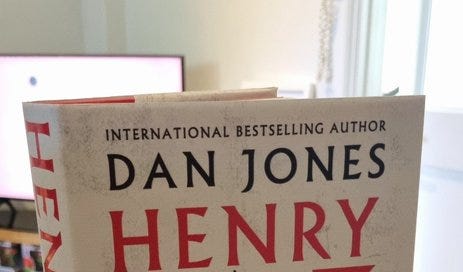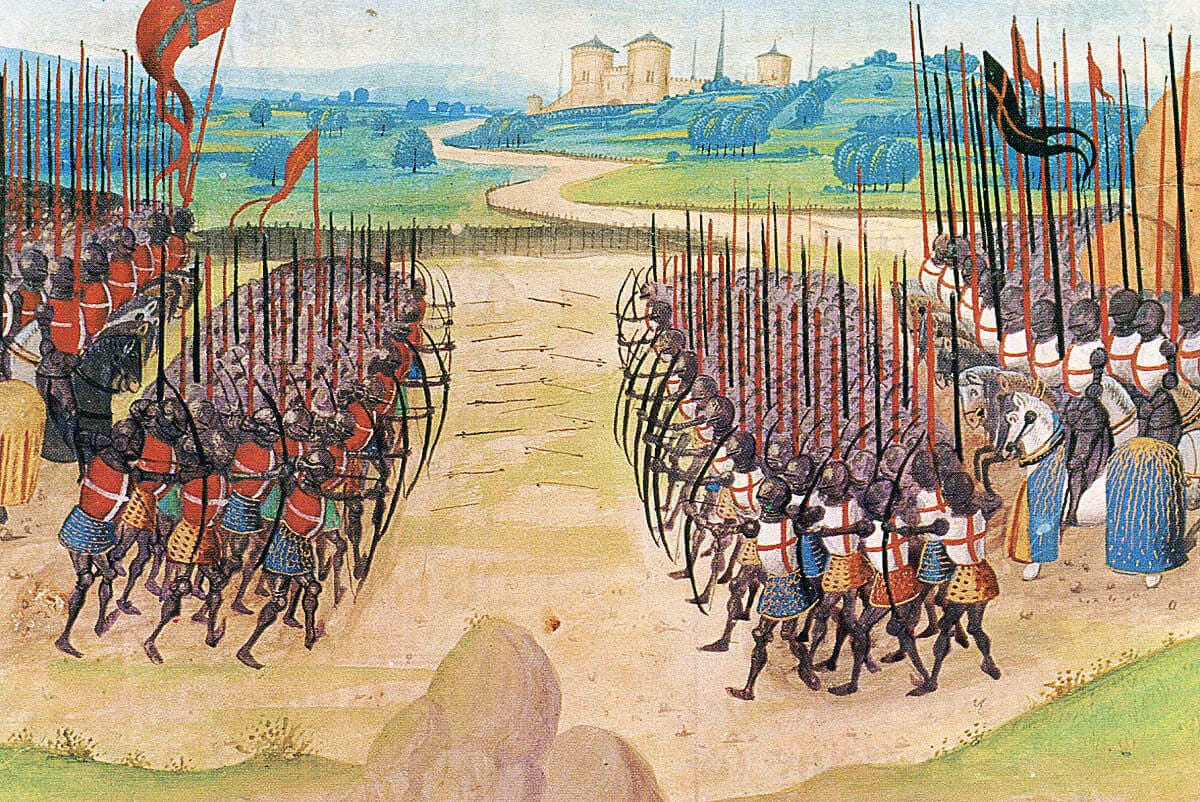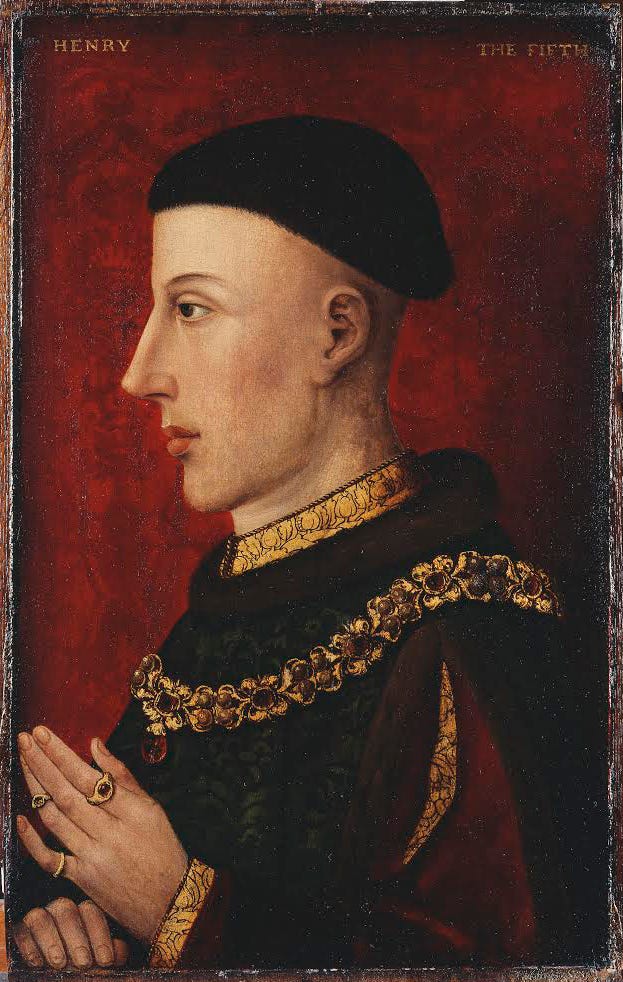Book Review: 'Henry V' by Dan Jones
‘A gripping, grand and almost conversational exploration’ in Jones’s ‘customary silken prose’
Dan Jones needs no introduction at this stage in his writing career, one of the few medievalists who has transcended the genre to attain mainstream success. His books litter the bookshelves of those with an interest in the medieval, and just as often those who don’t. He’s a rockstar of history, with hit after hit across which ever medium he has turned his hand to this week.
It is little surprise to learn Jones’s latest offering, ‘Henry V: The Astonishing Rise of England’s Greatest Warrior King’, lives up to the standard expected from the name on the front of the dust jacket. It is a lively, intimate, and nuanced account of a complex figure that sweeps the reader along on an immersive journey.
Jones has long stepped outside the boundaries of narrative non-fiction, popping up periodically on television, producing slick podcast content, and recently dabbling in a series of hugely energetic novels. Having found some time in his busy schedule, however, he has returned to familiar ground to pen this biography, but he’s picked up a few tricks on his outings.
Absorbing storytelling has never been an issue for Jones, who is a keen student of the craft of writing in all its forms. In Henry V, however, he has taken the curious, and perhaps risky, decision to employ the present tense, rather than the customary past tense that has long been preferred when describing events of yore. The influence from his podcast scriptwriting and fiction forays are immediately evident from the first paragraph.
Jones explains this decision in the introduction, and I think in the hands of a less capable or experienced writer, it may prove a questionable approach. But Jones knows his subject intimately, and understands how to deliver historical research that does not disturb narrative storytelling. The result is an immersive experience, where the reader is transported into Henry’s volatile world, into his stirrups, to observe the unfolding drama around him with an immediacy that transforms the reader’s appreciation of events.
As the author shows, his Henry rides, he fights, he prays, he plans and he rules. We exist alongside him, and we learn as he learns, we understand as he understands, and we act as he acts. There is an urgency to the words as we are carried along in the king’s company.
Where Henry is often concerned, Agincourt is traditionally the principal plot device upon which to hang his story, whether in fiction, in non-fiction, or most famously, on stage and screen. And in many respects, this makes sense, for 1415 heralded not only the apex of Henry’s life and reign, but arguably so too of medieval England.
But Henry did not arrive at Agincourt out of nowhere. Jones is keen to show in Henry V how his subject’s early life shaped his character, how experience and trauma moulded this most focused of monarchs into a warrior capable of winning such military renown even when the odds were stacked against him. He was not even, after all, born to be king.
We open with a passage detailing the excruciating medical procedure our book’s subject was forced to endure at just sixteen years old to withdraw an arrowhead that lodged deep into his skull. If a moment of great import in itself, with the very life of England’s heir in the balance, as Jones adroitly returns to throughout the work, once he was back on his feet, this procedure had profound effect on Henry’s mindset, driving the youth forward towards immortality, although not before he gives thanks to God by visiting the shrines at Canterbury and Walsingham. There is a pointed purpose to Henry’ s life thereafter, this most deeply pious of warrior princes, and he is able to exploit the mental and physical anguish of his battlefield injury to good effect.
Jones rightfully posits that most biographies that deal with Henry show a haste to reach the moment he holds the crown in his hands, when the not-so-young prince steps up to spur England and himself onto greatness. But these works, in their urgency, diminish the significance of Henry’s formative years – he was, after, twenty-six years old when he became king, already vastly experienced in martial and political matters, very much the finished article who knew exactly what was required from him once the crown rested upon his head.
It is only right then, that Jones takes us on a journey through Henry’s youth, placing us ringside as the prince gains his education in martial affairs. We see him learning how wars are planned during early campaigning in Scotland, and we follow him in his early exploits in Wales where he begins to appreciate the importance of finance and tactics.
This Henry is flawed, a boy trying to make headway under the most extraordinary set of circumstances. A father who has just usurped the throne, a kingdom beset by rebellion, a series of former mentors turning foe, and his shaky title challenged by shadowy forces that dart down from the mountains to mock his very existence. A series of tumultuous events envelop Henry, forcing him to be grow into the competent and confident figure he became, and whatever is asked of him, he learns to deliver, time and time again.
Henry accomplished a considerable deal during this extended apprenticeship, a dramatic and violent period from which he also mastered the ‘role of patience, persistence and political spin’. This apprenticeship was, as Jones astutely notes, ‘longer, more testing and rounder in its demands than that of any other English king since Edward I’ a century and a half earlier. He was able to use these years to build on his innate strengths and callus his weaknesses, developing a robustness he would wield with great efficiency once in the top job.
There also seems to be a streak of the obsessive about Henry, who repeatedly shows himself to be fixated on the even minor details when planning his military expeditions. When preparing his second invasion of France in 1416, for example, his hand is seen everywhere – he is writing letters personally seeking military aid, he is intensely annotating government documents unlike any previous king, he is concerned with itineraries and timetables, and defending his financial requirements in missives to bishops. Meticulous to a fault, nothing can be left to chance seems to be Henry’s way, having observed the administrative and military failures of others around him before he became king himself.
One interesting and lesser explored aspect of the well-rounded picture of Henry vividly painted by Jones is a man who learned from a young age the effectiveness of dramatic performance, probably picked up from Richard II. Whilst Henry is closely associated with his father and predecessor, Jones reminds the reader that some of the formative years of Henry V was spend under the tutelage and influence of the king his father deposed and murdered. Richard II was, by most metrics, a failed king, but his preoccupation with projecting his own majesty was adapted by Henry to great effect.
We see incidents like when Henry burned down the homes of the Welsh rebel leader Owain Glyn Dwr, or when he interrupts the torching of the heretic John Brady to implore him to confess, before returning him to the flames when he fails to do so. Jones details the extraordinary moment Henry protests his loyalty to his father during one meeting, in the course of which he theatrically presents a knife to his father and implores him to stab him if there is any doubt of his devotion.
He continues in such vein at his coronation, presenting the very image of sober, grave-faced, piety, the adoption of an impenetrable mask that he will never allow slip in the years to come. The warrior monk. These dramatic and very carefully considered pubic performances have the air of the populist about them. Behind these stylised acts, however, was always substance, which was what set Henry apart from his contemporaries, and those that came before or would come afterwards.
Henry looks the part, but more importantly he acts the part. He is a king who is strict on crime, even if it means executing former friends, and he is relentless is suppressing heresy, even if, in the case of John Oldcastle, that also means executing former friends. As Jones has it, ‘toughness and a near-total lack of sentimentality’ will become hallmarks of his character. He is aggressive in matters of foreign policy, and uncompromising internally where he finds his authority is threatened. His impatience knows no bounds – indeed, he is wont to the end his letters with ‘and hasteth that it be done’, regarding whatever his latest command is.
Though there is a lesser-explored human element to Henry, that Jones strives to reveal – the king enjoyed the harp for example, was an avid book collector, had a complex relationship with his siblings - it is difficult to look beyond the uncompromising force of nature he was. Even in moments of relaxation, there isn’t the sense that Henry ever had much compulsion to remove his battle-hardened sallet for long (perhaps natural considering he got an arrow in the face as a teenager prince). A consequence of his difficult youth when he was forced to the front lines to defend his ill-gotten inheritance, certainly, but Henry was soldier, most content planning, financing and then winning a war. It was what he knew, and it’s what we know him for.
Indeed, much modern criticism of Henry lies in what some have come to regard his war crimes. We can consider the mass execution of prisoners at Agincourt, or his ruthless refusal to show even a modicum of mercy at the sieges of Rouen, where women and children died in agony at his own command. Even at Meulen, amongst the dead that litter the rubble, lies one of his own loyal captains, who is hanged for a momentary lapse in concentration, the desperate appeals of Henry’s own brother waved away with a dismissive hand.
‘Henry is no saint’, his latest biographer agrees, but crucially adds, ‘nor does he presume be’. Though it is clear he presides over ‘great cruelties’, to Henry, and indeed his contemporaries, he is the very model of kingship. Surely, if God did not approve, Henry would not have been salvaged at sixteen years old when his face was skewered, nor would he have obtained crushing victory upon victory in the years that followed. Indeed, such was his unrelenting record of success, one chronicler even noted approvingly that he was an ‘angel of God’ on account of his unrelenting success in everything he attempted.
If we do not understand Henry’s cold-blooded nature from a distance of six centuries, his apparent incapability to occasionally favour the carrot over the blood-drenched stick, then it must be conceded his contemporaries, those who stood alongside him or had the misfortune to stand before him would, and seemingly did, reject our disapproving charges. To use a modern idiom, Henry may have been harsh, but he was fair by the law of the day.
For many reasons, some discussed, Henry V is not an historical figure I warm to, though Jones’s probing study of psychology, theirs not ours, has allowed for a wider appreciation of this relentless scarred Leviathan. Jones does not seek to soften this most soldierly of kings, to justify some of the harsher elements of his character, or to otherwise revise previous accounts which have been critical. The Henry as presented through Jones’s eyes is laid bare, his deeds shown without embellishment nor concealment, but crucially in the context of his age. It is left to the reader, ultimately, to make their own judgment on Henry – in so far as I expect I differ slightly from the author on my judgement as compared to his, is in itself a compliment to the even-handed and objective narrative presented.
Henry was who Henry was, a remarkable man of extraordinary drive and steely-eyed ambition, which formed much of the impetus within the person widely regarded, in the words of the book’s subtitle, ‘England’s greatest warrior king’. Hard times can make hard men, and none were fashioned more tougher than Henry V. Nonetheless, these qualities, as Jones consummately shows with his customary silken prose, made him a titan of rare ability suited to preside over ‘some of the most dramatic and memorable’ years in England’s entire history.
In this gripping, grand, and almost conversational exploration of a king who still casts an intimidating shadow across medieval studies, we finally see why Henry V was ‘lionised by the generation who knew him, idolised by those who followed and eventually mythologised by William Shakespeare’. And through Jones, a new generation will find their way to, perhaps, the most convincing multi-dimensional depiction of Henry there has been since the heady days the great conqueror breathed.







Great review! I absolutely loved this book. It has triggered something of an obsession with Henry V. I can’t get enough of him now.
I couldn't put this down. I've read all of his works, including the Essex Dogs fiction. He never disappoints!